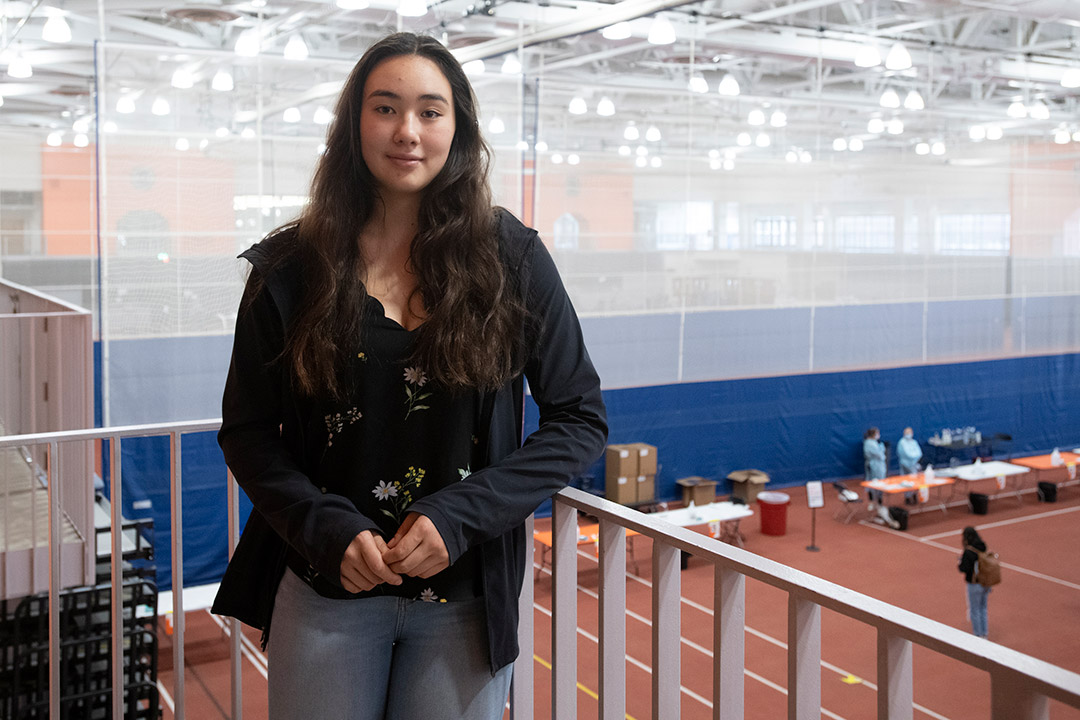Health majors get hands-on experience on Tiger Testing team
A. Sue Weisler
Anastasia Ueda learned new skills while on the Tiger Testing team that will help her in medical school. She graduates this year as third-year student in the biomedical sciences program in the College of Health Sciences and Technology.
Anastasia Ueda wanted to do her part to keep the RIT campus safe during the COVID-19 pandemic and joined RIT’s Tiger Testing team. She has administered the COVID-19 rapid tests to thousands of students.
“The pandemic has created unique opportunities, especially for those who want to pursue medicine, because there are these new kinds of jobs popping up like Tiger Testing,” said Ueda, a third-year biomedical sciences major and graduating senior from San Francisco, Calif. Ueda wants to attend medical school and, perhaps, become a surgeon.
As a member of the Tiger Testing team, Ueda contributes to the overall health of the campus while gaining experience interacting with a variety of people who come through the testing line.
“We test every student on campus every single week. We make sure everything goes smoothly and learn how to deal with any hiccups.” Ueda said. “I think just talking to the different people who come in is a good experience for anyone who wants to go into medicine.”
The Tiger Testing team employs nearly 90 students from across campus, with about 25 students majoring in degrees in the College of Health Sciences and Technology, said Jeff Siegel, associate athletics director ’15 MS (professional studies/project management), who manages Tiger Testing for RIT Athletics.
Siegel’s team strives to create a welcoming environment in the Gordon Field House for the 10,000 students tested weekly.
“I think when other students arrive and they see their peers being the ones instructing and helping them through the process, it becomes less intimidating,” Siegel said. “Also, having student employees with a health science background is fantastic because when students do have questions, our student employees are well equipped to answer and provide knowledgeable information.”
The testing team has given Amy La, a third-year diagnostic medical sonography major from North Chili, N.Y., a sense of agency. “Throughout this pandemic, I felt helpless that I could not do much to comfort and support others,” she said.
Similar to Ueda, La’s main role is administering the COVID test. They dress in gowns, face shield, and gloves, and greet students behind a table. They prepare test cards, collect nasal samples, and agitate the card to coat the sample in the reagent that will detect the coronavirus. Sometimes they are asked to assist students who are nervous about swabbing their own nose.
“I’ve had to twice,” Ueda said. “It’s pretty rare, but some people are uncomfortable.”
Empathy and teamwork make the testing process run smoothly, La said.
“There were times where we had a rush of students coming in, or a minor problem occurred, but as a team we worked together to become more efficient,” La said.
La is grateful for the chance to work with students from different majors to accomplish high volumes of testing each week. Tiger Testing has become a significant part of her RIT experience, and she is proud of the team’s effort.
“Completing a class group project is different experience than administering 100,000-plus COVID tests within a few months,” La said. “It is astonishing how many boxes of tests we have gone through.”
The Tiger Testing team works fast. “We go through so many boxes,” Ueda, said, agreeing with La. “At my last shift I kept track of how many it was at my table alone—15 boxes (each containing 40 tests) in four hours. That’s about 2.5 tests every minute, if you average it out.”





